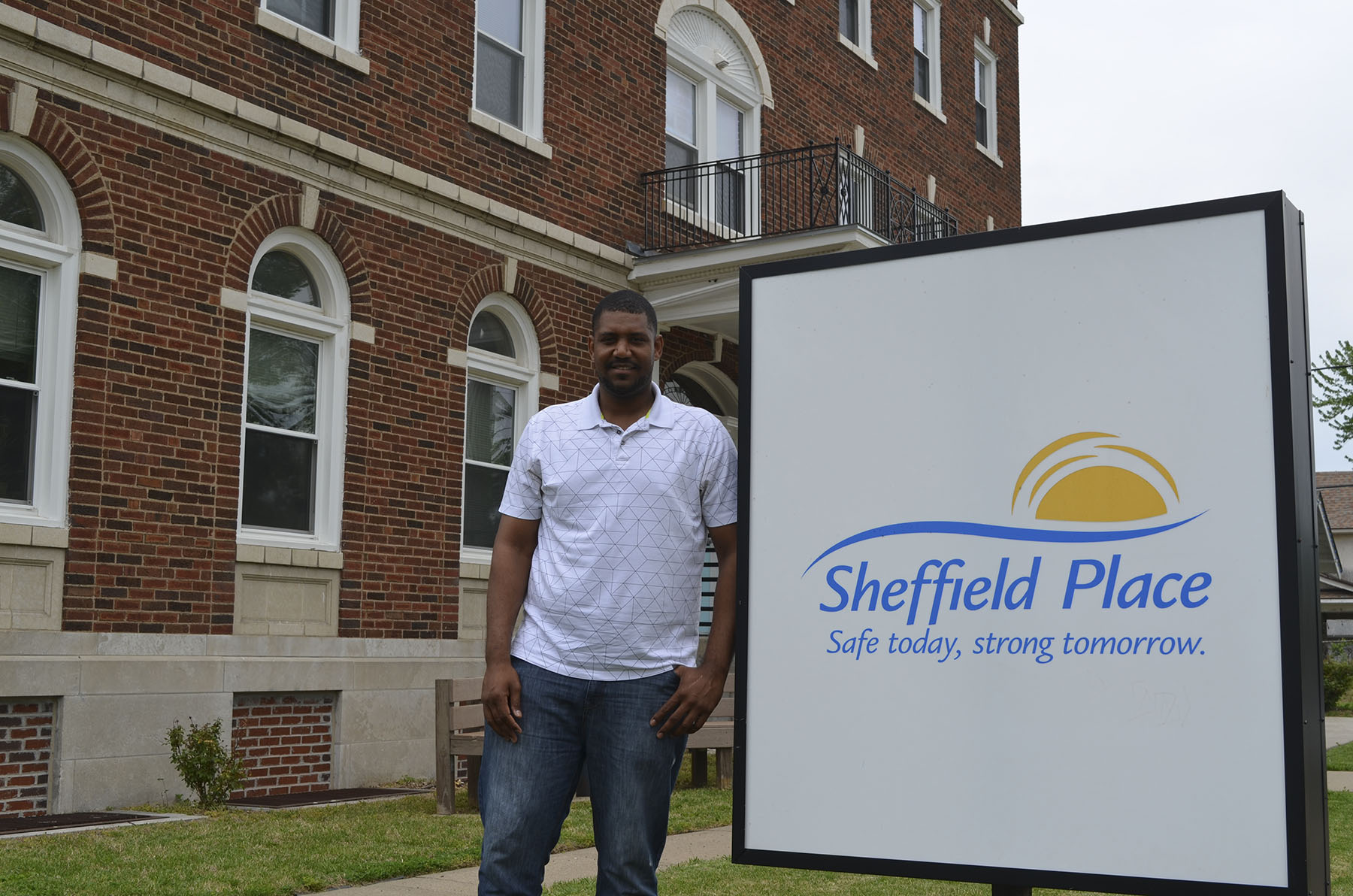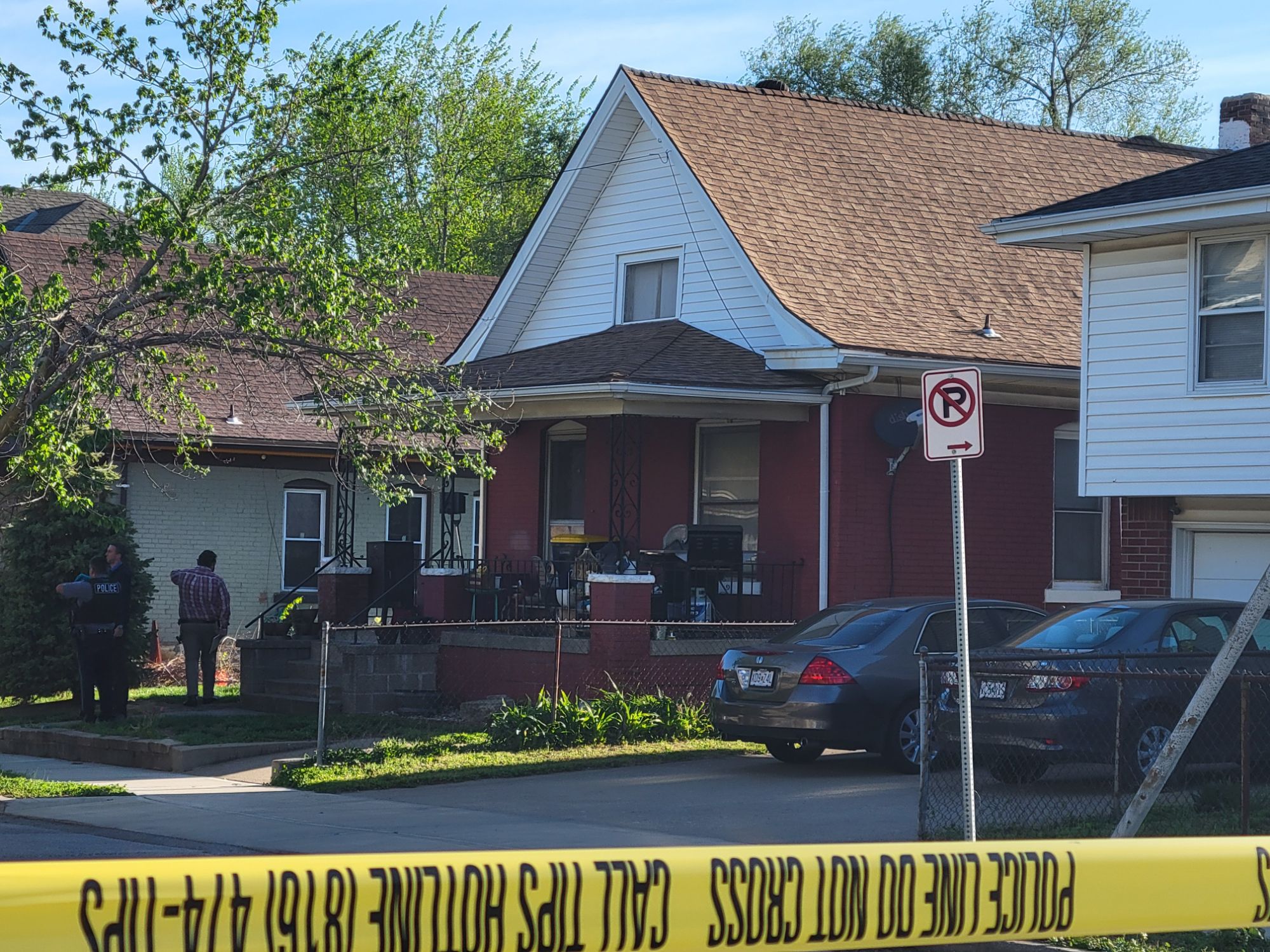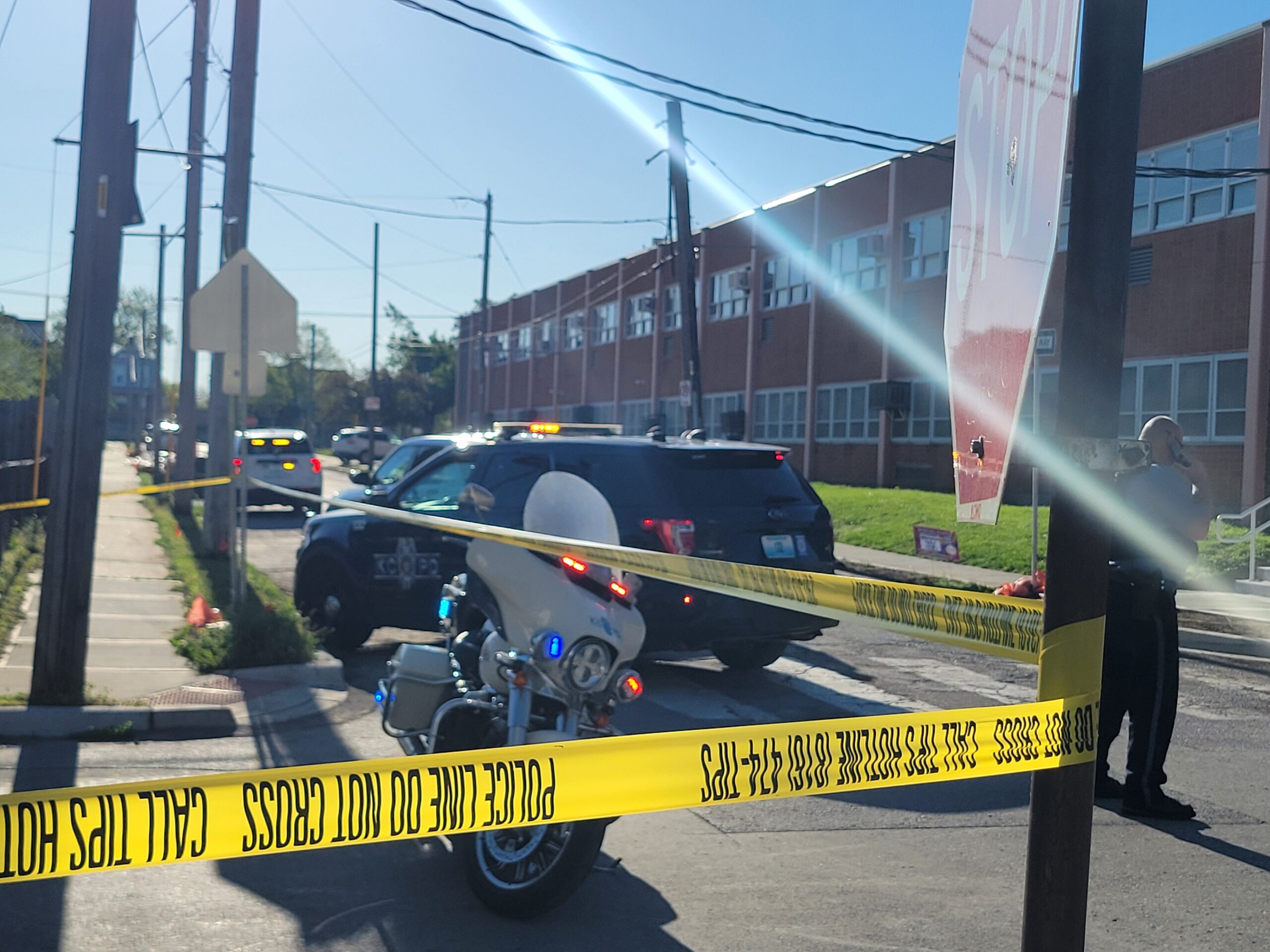By Paul Thompson
Northeast News
Luis Colon is nearly a decade removed from his most public triumphs on the basketball court, but the former Kansas State University center is no less of a star in his new role as a youth case worker in the Historic Northeast.
Colon, a 6-10, 265-pound center who played for the Wildcats from 2006-2010, is roughly a month into his latest challenge at Sheffield Place, a Northeast transitional living and treatment center that exclusively serves homeless mothers and their young families. According to Executive Director Kelly Welch, Colon’s group interview at Sheffield Place left staffers stunned. Welch, who acknowledged that she wasn’t previously aware of Colon’s athletic career, was struck not by his physical presence, but by his measured disposition and passion for the work.
“He just had some really unique ideas, and really thoughtful ideas,” Welch said. “He’s somebody who is obviously interested and engaged, and a really good listener.”
The interview with the former K-State big man, now 31 years old, was a surprise coming from a former Division I athlete. Among the ideas offered by Colon was the creation of an independent living program for teens who were about to be living on their own. He also discussed his interest in developing summer programming and conducting group sessions with the kids of Sheffield Place. Rather than focusing on making connections through athletics, Welch relayed that Colon suggested the best way for him to reach the kids was by playing board games.
In short, Colon didn’t neatly fit the stereotype of a big-time collegiate athlete.
“He’s one of the least judgmental people that I’ve met,” Welch said. “We are thrilled; we feel very fortunate that he is here. He’s kind of full of contradictions, but it’s really positive and thoughtful.”
That Colon highlighted his move at the age of 14 from Puerto Rico to Florida, rather than leading with his athletic exploits at the collegiate level, left a positive impression on Welch and the rest of the staff. Colon’s interview was so impressive, in fact, that it left those who were present for the group interview glancing around the room with bewildered glee.
“After he left, I was like, ‘Hey guys, I was there and I heard it all,’” Welch said with a laugh.
The fact that Sheffield Place was even in a position to hire a youth case worker was a matter of unique circumstances. In November of 2016, Jackson County voters approved a 1/8-cent sales tax in support of the Community Children’s Services Fund, which allocated $5.5 million for nonprofit organizations in 2018 for social services aimed at the county’s youth population. As the funds became available, Sheffield Place was grappling with a new problem: the organization’s growth had welcomed more and more kids into the fold, sparking a need to provide specific social services. Seeing an opportunity, Sheffield Place applied and was approved for funding. As a benefactor of the Community Children’s Services Fund, Sheffield Place was suddenly in the market for a youth case worker at its 12th St. facility.
Enter Colon, who comes off as thoughtful, soft-spoken, and dedicated – traits that Welch insists aren’t contrived. In a sit-down interview, Colon was open about how his own experiences navigating the youth basketball landscape in Florida left him motivated to become a positive influence once a back injury ended his own playing career. Colon’s passion led him into coaching competitive basketball at the youth level in Miami.
“Sometimes I noticed that the coaches weren’t doing a good job of guiding them to making the right decisions, and mentioning the pros and cons about everything,” Colon said. “When you’re a good player, you get a lot of attention while you’re playing. But after basketball, then what?”
A light bulb moment for Colon occurred when he encountered a talented young player who was struggling with life in the foster care system. The player’s predicament motivated Colon to conduct research and speak to case managers about the social services available in the area.
“I ended up working in mental health, to be able to teach coping skills to these type of kids that have a lot of talent, but they just can’t handle it by themselves,” Colon said. “It helped me to be a better coach, and it helped me to be a better person.”
Eventually, Colon brought his wife and son to Kansas City, where he initially worked at PACES, Inc., a mental health facility in Wyandotte County. Now at Sheffield Place, Colon works with children whose families are in difficult positions.
“A lot of women have been incarcerated and have lost custody of their child,” Colon said. “They’re trying to build up again.”
Colon added that the kids he’s been working with during his first weeks at Sheffield Place have often been distressed.
“When you have a parent that ends up losing everything, they also lose their head; they lose their mind,” Colon said. “They tend to cope with drugs and alcohol. As we all know, kids mimic their parents, and they follow the same culture.”
Though Colon has found success in his career delivering positive messages to kids, he’s quick to acknowledge that there are also frustrations in the job. The most difficult situations revolve around mothers who are unwilling to accept their circumstances.
“It’s having a mom who is in denial about her child’s mental status, or who is in denial about what’s happening to her life,” Colon said. “It can be frustrating, but I empathize. I come from a place that has a lot of that, so I empathize a lot.”
Colon seems so composed, it’s somewhat hard to imagine him buckling under pressure. But asked if he ever feels overwhelmed, Colon is unequivocal.
“All the time; are you kidding? All the time. It’s hard to leave work at work – you always take work home,” he said. “My poor wife has to listen to me vent sometimes. It’s not a job, it’s a lifestyle. Social work, especially when you work with kids, you truly care about them because they are innocent.”
The biggest hurdle oftentimes is establishing a baseline of trust, especially when kids have been through the ringer at a young age. He recalls his experiences in Florida working with victims of human trafficking.
“How can I tell a kid like that to trust me, you know?” Colon said.
Despite all those barriers, Colon says that he’s found success in his field. When asked what separates himself from others, Colon carefully considers the question.
“I think I do my research and I truly care for them. Maybe it’s my height,” he says with a laugh. “I try to make eye contact, I’m always truthful to them. I don’t lie to them even if it will be to my benefit.”
The flip side of Colon’s difficult work is the overwhelmingly positive feeling that accompanies a breakthrough with his toughest cases.
“I have a kid right now that was failing all his classes in Florida. He was fronting everything; wouldn’t listen to mom, wouldn’t listen to teachers, daddy was abusive,” Colon said. “He attempted committing suicide several times before I met him.”
At their first meeting, the young man wouldn’t make eye contact, and barely spoke a word. So Colon invited him to gym, where the two shot hoops together. The next day, he was ready to go to the gym again. He wasn’t very good at basketball – and Colon told him so in good humor – but he began opening up.
“He decided to do Taekwondo. Nowadays, he’s in school, passing his grades, and he’s on his way to college,” Colon said. “I talked to his mom about a year ago in Florida, and she said that he has made a drastic change that is very positive.”
“They don’t pay me money for that; I just do my work,” Colon added. “But he inspired me to continue to do it for other kids.”
So how do those moments – where a real breakthrough is made with a kid who is struggling – compare to Colon’s most triumphant moments on a basketball court? Colon explained the difference: with basketball, he felt happiness; but in his current work, Colon has found pure joy. The breakthroughs, he says, compare favorably with his best basketball achievements, up to and including Kansas State’s 2010 run to the Elite 8 in the NCAA Tournament.
“Being in a big game, it’s a game. It’s an awesome game, and at the time was my life, but it’s still a game at the end of the day,” Colon said. “But what I do right now is for the real world; it’s for life, it’s for society. It’s to make a better country, a better community.”
At the conclusion of the interview, Colon allows himself to peer into the future. What legacy would he like to leave on the children who come through Sheffield Place?
“I would truly like to empower families, and help kids to be in a safer place. I would hope to hear the news from some of my clients going to college, doing the right things, becoming professionals, and just being positive and wanting to do similar things to what I’m doing,” Colon said. “If I can keep most of my kids away from that, then that would make me a very joyful and happy person.”




















